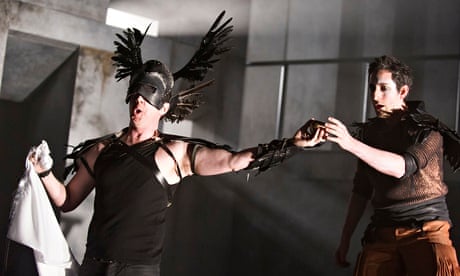English Touring Opera's new staging of King Priam marks the fulfilment of a long-standing ambition on the part of its director, James Conway, to bring Michael Tippett's tremendous 1962 anti-war opera to a wider public. It's a brave, noble effort, though one to some extent hampered, inevitably perhaps, by practical constraints. In order to fit the work into some of its venues, ETO are using a reduced orchestration by Iain Farrington, which preserves the brassy clamour of the battle scenes, but dampens the string-based lyricism elsewhere. Conway also has to bring some of the offstage choruses on stage, which creates intermittent problems of balance, in the closing scenes above all.
But it's handsomely done. Troy, astonishingly designed by Anna Fleischle, is a place of fetishes and totems where instinct lurks beneath an almost baroque veneer of civilisation. Weaponry is made from animal bones. Paris's abandoned cradle is later discovered to contain a store of arrows. Both the complex narrative and the tricky debates about determinism and free will are presented with great clarity. Conway views the opera as being as much about sex as war: the scenes between Nicholas Sharratt's glamour-boy Paris and Niamh Kelly's self-assured Helen, and – above all – between Charne Rochford's powerhouse Achilles and Piotr Lempa's full-on Patroclus, are palpably erotic.
At the centre of it all is a performance of ravaged majesty from Roderick Earle in the title role – very disquieting in his self-abasement before Achilles in the big Homeric dialogue over Hector's corpse. Laure Meloy is his implacable, unsympathetic Hecuba, Camilla Roberts the fierce, prudish Andromache. Rochford won't sing softly, but it sounds good, particularly when emitting Achilles' terrifying war cry. Unnerving, seductive stuff, and utterly compelling, despite its flaws.
Did you catch this show – or any other recently? Tell us about it using #gdnreview

Comments (…)
Sign in or create your Guardian account to join the discussion